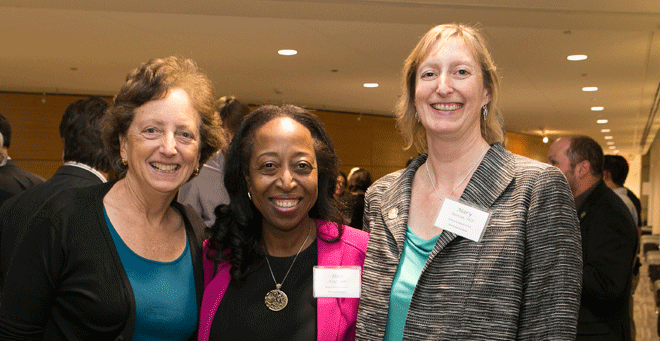 |
|
| Mary Munson, PhD, (at right) spoke with the Boston Globe about help she received from the UMMS Development Office to better explain her research to a lay audience. She is pictured with Phyllis Pollack, MD, clinical associate professor of pediatrics, and Jean King, PhD, associate provost for biomedical science research and professor of psychiatry, at the 2015 Hudson Hoagland Society annual meeting. |
Two staff members in UMass Medical School’s development office hold doctorates in science, and were chosen specifically to help faculty researchers better explain their highly scientific work to potential donors—an innovative way to fundraise as government funding continues to decline, according to a June 11 story in the Boston Globe.
“The research our scientists are doing doesn’t always present itself well to a lay philanthropic audience, which is another way of saying it’s way over people’s heads, and you don’t typically support what you don’t understand,” John Hayes Jr., interim vice chancellor for development, told the Globe. “Our role is to coach the scientists to present their work in such a way that a nonscientific audience can understand it, grasp it and find the relevancy of it, with the end hope that the lay audience will give more money.”
Tracy Schmidt, PhD, who received her doctorate in biomedical sciences at UMMS, told the Globe that her current job as corporate and foundation relations manager at UMMS calls for her to be “a bridge to interpret the language of science to people who aren’t scientists.”
Connie Johnson, PhD, director of individual giving for research at UMMS, earned her doctorate in organic chemistry from Princeton. Mary Munson, PhD, associate professor of biochemistry & molecular pharmacology, said Johnson encouraged her to simplify her speeches and explain how her research affects health.
“She’ll say, ‘You’re still writing for scientists, you’re not writing the big picture, you’re not writing for the right audience,’ ” Dr. Munson told the Globe. “A talk I would give to junior scientists and a talk I would give to donors are completely different, and before I spoke with [Johnson] I had no idea how to explain my research to nonscientists.”
Read the full story at: UMass making the hard sciences a little softer.
Related link on UMassMedNow
Hudson Hoagland Society celebrates 30 years